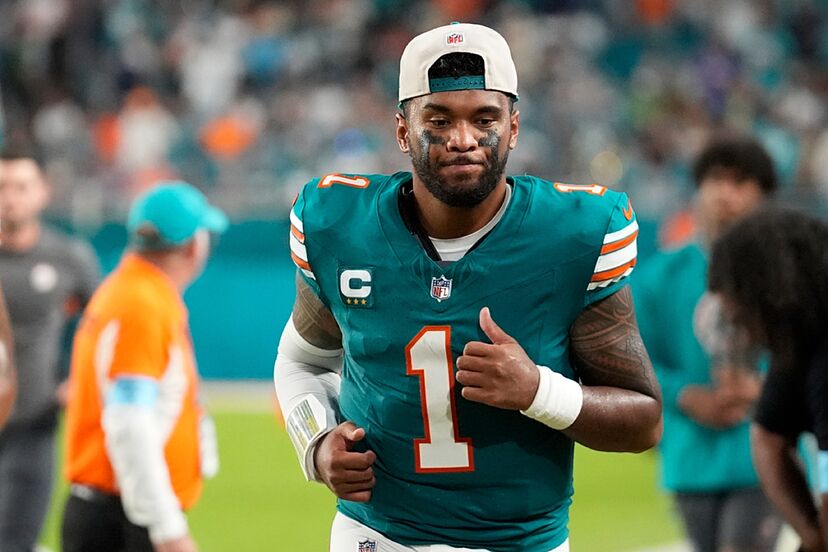Miami Dolphins quarterback Tua Tagovailoa has suffered his third concussion in just two years, sparking significant concerns about his long-term health. Despite this, Tua Tagovailoa has no plans to retire, even though many in the media and several NFL players have suggested he consider stepping away from football for his safety. These voices emphasize the serious risks of repeated head injuries, urging him to prioritize his well-being over his career.
Tua Tagovailoa’s football career has been marked by impressive achievements from an early age. Born in Hawaii, he became a national sensation while playing high school football at Saint Louis School in Honolulu. His exceptional talent earned him a scholarship to the University of Alabama, where he became a college football star.
Tua Tagovailoa’s most memorable moment in college came during the 2018 College Football Playoff National Championship. As a freshman, he led Alabama to a dramatic comeback victory over Georgia, throwing a game-winning touchdown in overtime. This performance solidified his reputation as one of the top prospects in the NFL.
In the 2020 NFL Draft, the Miami Dolphins selected Tua Tagovailoa with the fifth overall pick, believing he could be the franchise quarterback they had long sought. In the NFL, Tua Tagovailoa has demonstrated his potential, but injuries have often disrupted his progress. Over the course of his NFL career, he has accumulated 8,015 passing yards, 55 touchdown passes, and a 66.7% completion rate, placing him among the league’s top young quarterbacks. Tua Tagovailoa’s leadership has also propelled the Dolphins into playoff contention, making him invaluable to the team’s aspirations.
However, despite his success, injuries have followed him throughout his career, most notably concussions, which have raised concerns about how long he can safely continue to play at such a high level.
Concussions are one of the most serious issues plaguing the NFL, and Tua Tagovailoa’s case has become an example of the dangers of repeated head injuries in the sport. Each concussion increases the risk of long-term neurological problems, such as chronic traumatic encephalopathy (CTE), a degenerative brain disease linked to repeated head trauma. CTE has been found in numerous retired football players, leading to tragic consequences like memory loss, depression, and in extreme cases, suicide.
The NFL has made efforts to improve player safety, especially concerning head injuries. The league’s concussion protocol is designed to identify and address concussions immediately. Players showing concussion symptoms are required to undergo medical evaluation and cannot return to play until they pass a series of tests that assess their cognitive and physical recovery. While the protocol has improved over the years, it still faces criticism, as players are often eager to return to the field despite not fully recovering.
Tua Tagovailoa’s concussions have reignited discussions about the NFL’s handling of head injuries. His most recent concussion is particularly alarming because it’s his third in two years, raising concerns about the long-term toll these injuries could take on him. While the Dolphins and the NFL have assured fans that player safety is their top priority, many critics argue that no amount of precaution can completely mitigate the risks of playing such a physically demanding sport.
As much as Tua Tagovailoa loves football, there comes a point when the risks may outweigh the rewards. With three concussions in such a short time span, Tua Tagovailoa faces the possibility of permanent brain damage if he continues playing. Former players and media personalities have already begun to urge him to prioritize his health and consider retirement. Players like Andrew Luck and Chris Borland have retired early for similar reasons, choosing to leave the game they loved to preserve their long-term well-being.
Tua Tagovailoa’s decision not to retire is understandable—he’s passionate about the game, and at 26 years old, he still has plenty of potential left. However, the risks associated with concussions are undeniable. If he suffers another head injury, it could have life-altering consequences that extend far beyond the football field. His health should always come first, and while retiring may be difficult, it’s a decision that could protect him from irreversible damage.
In addition to the physical dangers, Tua Tagovailoa must also consider the emotional impact his injuries may have on his family. Football is a tough game, but the toll on players’ families can be just as challenging. Watching a loved one endure multiple concussions, knowing the potential long-term effects, is a burden no family should have to bear.
Tua Tagovailoa has already achieved an incredible amount in his young career, from leading Alabama to a national championship to becoming the Miami Dolphins’ star quarterback. However, with three concussions in two years, he faces a crucial decision about his future. While he has no plans to retire, the risks to his health are significant. No matter how much Tua Tagovailoa may love the game of football, his long-term well-being should be his top priority. As hard as it may be, walking away from the game could ultimately be the best decision for him, his health, and his family.
Miami Dolphins QB Tua Tagovailoa has no plans to retire after latest concussion

